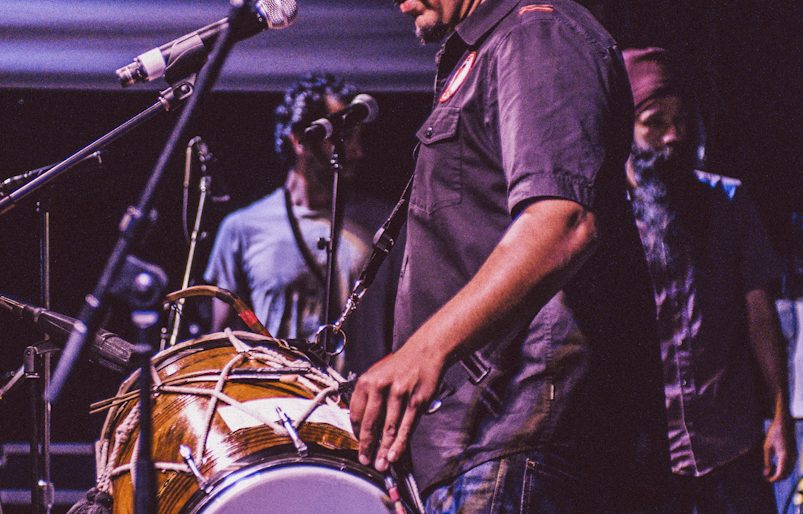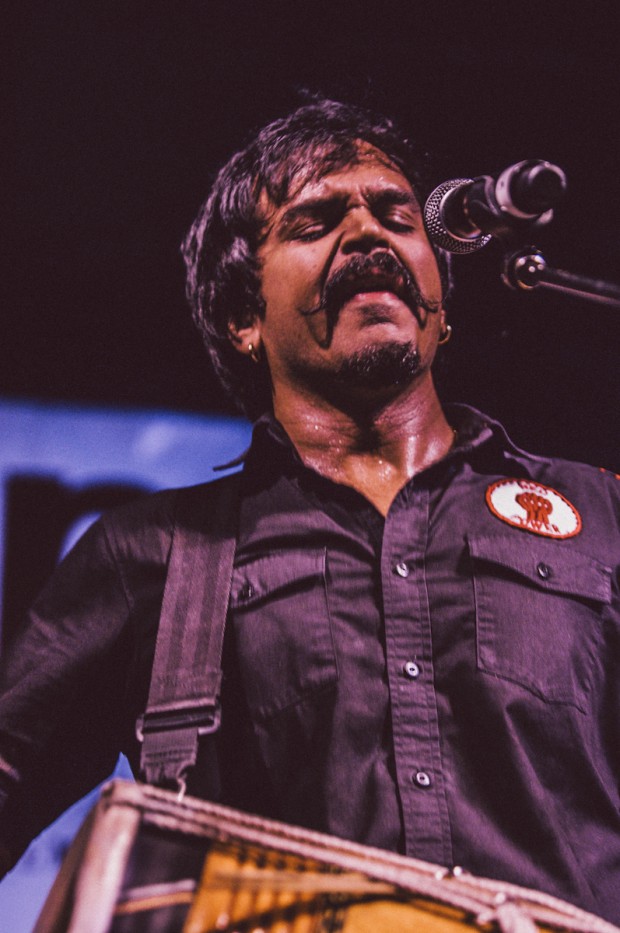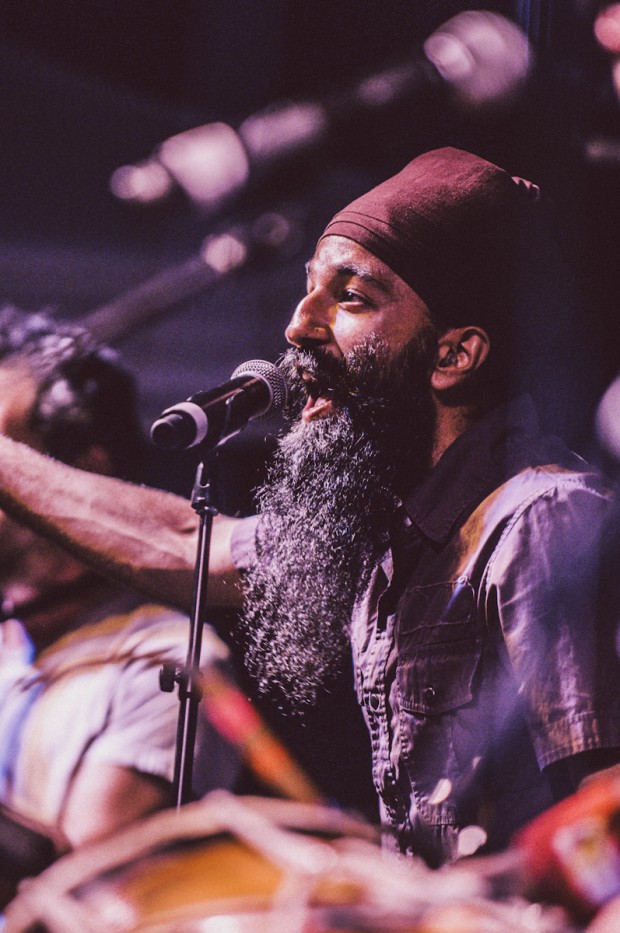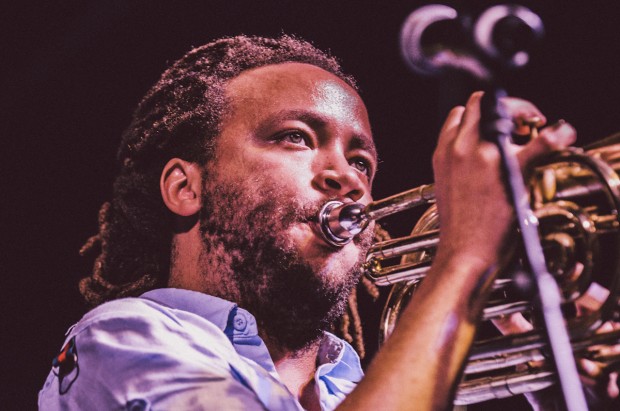
Interview: Red Baraat’s Sunny Jain on throwing down for all walks of life (playing Free at Noon today, The Blockley tonight)
There’s no magic or alchemic wizardry behind Red Baraat’s successful synthesis of East-meets-West. They just know the key to get asses shaking.
The Brooklyn-based band, having melded elements of jazz, funk, go-go, bhangra and Bollywood into an expansive and explosive final product since 2008, works on a simpler, more matter-of-fact level, according to bandleader and dhol drum player Sunny Jain.
“One main reason I would say is the fact that you have five horn players and three drummers and these guys are all playing their hearts out,” he says, referring to Red Baraat’s always-impassioned live performances. It may be as simple as that, really. “They’re serious musicians. They’re not just people screwing around and putting on a show. These guys know their instruments in and out, but they also know how to throw down. They party hard on the stage. I think that brings a lot to the sound, having eight people up there, when there’s just a lot of energy and passion that’s being brought.”
In other words, Jain and company know how to go hard. They demonstrated this at the XPoNential Music Festival and will again today at the Free at Noon concert, and tonight at the Blockley. All eight Red Baraat members come from extensive musical backgrounds, cutting their teeth professionally and methodically through schooling from Berklee College of Music and other programs (trombone whiz Ernest Stuart is a Temple grad). Between Jain, Stewart, saxophonist Mike Bomwell, trumpet players Sonny Singh and MiWi La Lupa, sousaphone player John Altieri and drummer Tomas Fujiwara, Red Baraat possesses the highly refined technical skills necessary to make their unique fusion of cultural sounds and rhythms work.
“I also don’t know if it’s necessarily just a genre thing,” says Jain about any given Red Baraat show’s crowd reception. “It’s also interesting that the spotlight always shifts. I think that’s cool for people to notice that there’s not a lead singer and a band surrounding that person.” Indeed, Red Baraat is highly democratic in its live performances, with band members often shifting stage presence, no one yielding their level of wiling out.
The band is fascinating in a few different ways. Aside from their huge, continent-spanning range of sound and influence (as heard on records Chaal Baby, Shruggy Ji and Big Talk), there’s a more academic, ethnological angle to explore here, something to be said about the American experience of culture fusion and evolution.

Red Baraat | Photo by Eric Ashleigh | showtographe.com
“I grew up with Punjabi music, bhangra music and Bollywood music in various Indian functions,” says Jain, born to Punjabi parents in Rochester, New York, delving into his history with traditional Indian music and culture. He started playing drums at age 10, first with symphonic jazz percussion before moving onto a drum set two years later. “My private instructor at the time was a jazz drummer so I sort of fell in love with jazz around then,” he says. Jain studied jazz performance at Rutgers before pursuing Indian percussion on the double-sided dhol drum.
“The dhol was more intuitive to me because it had sticks,” he says, again drawing parallels to his jazz education. “It’s a different technique and it’s a different instrument with different rhythms and whatnot but it was still something I could wrap my head around a bit easier and not feel completely overwhelmed.”
Having one foot in both an Indian cultural environment (growing up listening to Indian brass and bhangra groups) and a modern, Western one (digging hiphop and rock music, like most kids) Jain says that the decision to forge Red Baraat’s sound into what it is now was both conscious and organic. “I’ve always been a jazz musician,” he says regarding his own background. But he knew that he didn’t strictly want to create a jazz group. Or a bhangra group. Or a marching band. “It was natural in the sense that my compositional process has always been informed by my experiences- everything that you come from.”
 In this light, Red Baraat is indicative of the American ideal of the “cultural melting pot” – components from multiple ethnic and social backgrounds coming together to create something new and wholly unique. “[Red Baraat] is an amalgamation of everyone’s influences that are in the band,” says Jain. “Everyone is imprinting their sound and their background, although it’s rooted in this Indian-American experience.”
In this light, Red Baraat is indicative of the American ideal of the “cultural melting pot” – components from multiple ethnic and social backgrounds coming together to create something new and wholly unique. “[Red Baraat] is an amalgamation of everyone’s influences that are in the band,” says Jain. “Everyone is imprinting their sound and their background, although it’s rooted in this Indian-American experience.”
This wide representation may have something to do with the audience it reaches as well. Even though the kind of weird descriptor “world music” may get tacked onto Red Baraat in the CD section of a Barnes and Noble, Jain attests that there’s no one particular ethnic group that he finds at Red Baraat’s shows – even though the jams they kick out may sound catered to a particular culture at a given point- and that’s sort of the idea.
“It’s pretty mixed up,” he says about the Red Baraat demographic. “When we play in D.C., for whatever reason that happens to be our biggest South Asian crowd. Every time we play there it’s predominantly South Asian. Like 50 to 80 percent. In New York it’s maybe 25 percent. In New Orleans it’s one percent. San Francisco might be 30 percent.” A theory that Jain came towards is that because the band covers so many bases and represents so many different ethnic experiences, there’s a much smaller barrier to entry.
“There are all walks of life coming to these shows,” he says. “I think everyone is kind of intrigued by us because they can find someone up on stage that they physically resemble because there are so many different kinds of people up on stage. People may gravitate towards people that are similar to them in look. But I think more importantly is that musically there are just so many different elements coming together that people can just relate to it.”

Red Baraat | Photo by Eric Ashleigh | showtographe.com
“When we’re down in New Orleans, people hear New Orleans brass music in our sound,” Jain says. “When we’re down in D.C., people hear go-go. When we’re around South Asians people certainly hear bhangra and Bollywood. Jazz musicians hear the solos.”
Aside from rocking incredibly hard, Red Baraat has found a way to appeal to almost any set of ears. “Everyone hears something different in us.”
Red Baraat performs at this afternoon’s Free at Noon concert at World Cafe Live – RSVP here or listen at noon at 88.5 FM or XPN.org – and performs tonight at The Blockley – tickets and information can be found here.